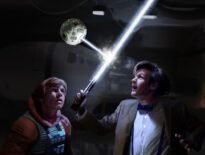How do you measure passion in a person? A shy, reserved person can have just as much passion for something as the explosively expressive person sitting next to them. They just won’t show it to us. Is that on them, or is that on us for not seeing it, and making assumptions?
On the other hand, that shy person who gives away very little could be hiding a hideously dark soul. It’s not really our business until they show up at our house. The point is, we just don’t know sometimes.
Side note #1: I picture the usually calm Donald Pleasence sitting and staring off into space next to an animated Timothy Dalton in Time Lord robes spitting as he projects.
There was a discussion recently on Chris Chibnall’s passion for doing Doctor Who. One side claimed he had little or no passion, while the other side claimed that he was not only passionate about it but in fact had dedicated his life to it.
We do know for a fact that he’s been a fan of the show pretty much all of his life. I cannot say that I’ve heard many (or really any) stories about Chibnall doing anything above and beyond for the show until becoming showrunner. Usually, being a fan is enough anyway.
He’s a life-long fan, but so are many of us. I don’t know if any of us would say we’ve dedicated our lives to the show. That’s a bit extreme.
I’ve been a fan for over 40 years, and even produced the 168 page colour graphic novel adaptation of The Daleks’ Master Plan for the 50th anniversary, with proceeds to Children in Need. So I think I qualify as a huge fan, but I’m sure there are bigger and more knowledgeable ones, and I certainly haven’t dedicated my life to it.
Side note #2: I wonder — Steven Moffat did The Curse of Fatal Death for Children in Need, and Russell T Davies did an early Doctor Who novel in the ’90s, no? Did Chibnall do any side projects early on, besides Open Air? Genuinely curious.
Now, for the current era of Doctor Who, Chibnall has definitely dedicated a large portion of his life to the show — but that’s the job. Russell did it, and Steven did as well. When he’s not there for filming, editing, etc., he is writing, or overseeing 100 other things.
Mark Gatiss apparently deemed the job a “poison chalice”. I hold nothing against Chibnall if he didn’t want the headache and constant workload. It certainly doesn’t make him any less of a fan.

But if the BBC wooed him, offered more money, more time off, and whatever he wanted to do with the show going forward? Granted. So in the end, he worked out an initial five-year, three-series deal. That would allow him more time off from producing the show to spend on holiday with his family.
Bottom line, he does his job — where he’s fully dedicated to the show — and then turns off the Doctor Who part of his brain and spends time with family, which, after all, is more important.
But it’s impossible to measure passion, even after two series. After a sedate, often remedial level Series 11, Chibnall answered critics and declining ratings by upping the stakes and apparently blowing up the status quo (along with Gallifrey again) in Series 12. From Barney the dinosaur one year, to total anarchy, retconning, and destruction the next.
Was that an escalation of passion in doing the job? Chibnall had indicated that he had a definite plan going into the position and this was part of it. If that were the case, we know there was at least calculation, if nothing else.
Or was it the result of getting a lecture by the BBC, encouraging him to shake things up? Depending on the severity, or lack thereof, in such a discussion, the end result might have a hint of reactionary desperation. But passion can be hard to pinpoint.
You can be professional, responsible, and dedicated, but lacking passion. Everyone’s different.
Watching the recent San Diego Comic Con panel, we got some bits and pieces regarding the structure of the storytelling for the upcoming Series 13, met the two new guys, and viewed a 40 second clip of the coming series. Chibnall’s usual media blackout was in full display.
Side note #3: there are advantages to the media blackout. But it seems to be at odds with the notion of such a panel under such circumstances, but I’m guessing there was an obligation.
Chibnall himself said what he could on the panel in his own, quiet manner. I can say there was a twinkle in his eye. He’s just a different sort to RTD or Moffat in public. He does show some emotion after all; he’s not a robot.
Those that embrace what he’s done say the passion is there. They see it and feel it from what he’s done on the show. That it’s fun and interesting.
Those that abhor what’s gone on so far on say no. They say they have a hard time equating this mediocrity with a passionate creator.
The truth? We don’t know. It’s probably somewhere in between the two extremes, though.

